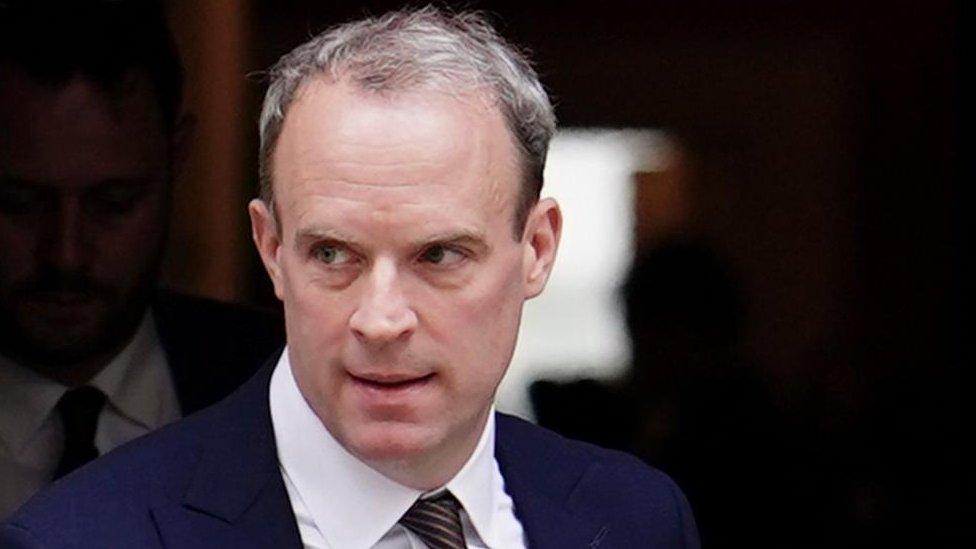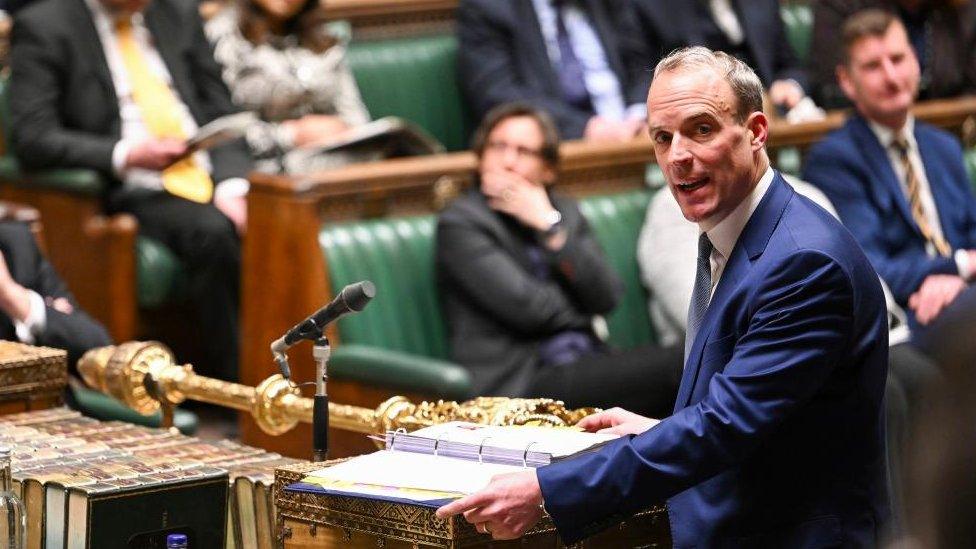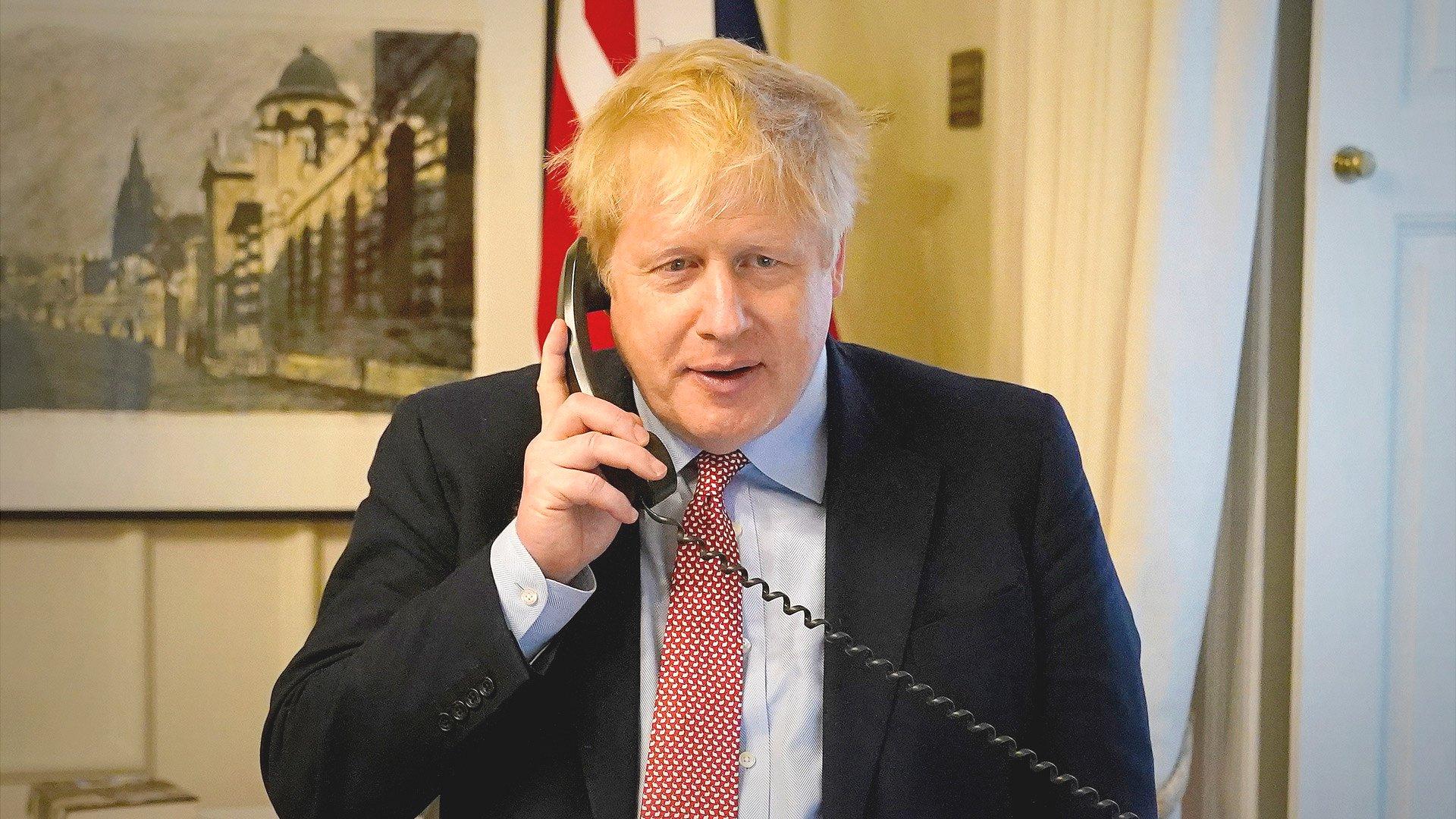Who is Dominic Raab? Karate black-belt who resigned as deputy PM
- Published

Dominic Raab has resigned as deputy prime minister, following an investigation into claims of alleged bullying.
Mr Raab, who was also the justice secretary, had always denied the allegations but said he would quit if bullying claims were upheld.
He has done that, but in his resignation letter to Rishi Sunak, and in an article penned for the Telegraph newspaper, Mr Raab also hit back.
While the report from senior lawyer Adam Tolley KC makes uncomfortable reading in parts, Mr Raab - who's changed his Twitter handle to "MP for Esher and Walton, father of two, boxing fan" - has thrown a punch of his own.
In his letter to the PM, he said ministers needed to be able to give direct critical feedback and exercise direct oversight over their civil servant officials.
He apologised for any "unintended" stress caused, but referred to the "pace, standards and challenge" he brought to the Ministry of Justice.
The report cleared the former frontbencher of shouting and swearing at staff, and he was not found to have used physical gestures - but it did say that style of working as a minister was "inquisitorial, direct, impatient and fastidious".
And it paints a picture of a man who worked from 7.30 in the morning until late at night and at weekends.
Mr Raab was found to have described the work of officials as "utterly useless" and "woeful" while he was justice secretary.
And as foreign secretary, a role he served in from 2019 to 2021, the report says in one instance "he acted in a way which was intimidating, in the sense of unreasonably and persistently aggressive conduct in the context of a work meeting. His conduct also involved an abuse or misuse of power in a way that undermines or humiliates."

Raab basics

Date of birth: 25 February 1974 (age 49)
Job: Justice secretary, deputy prime minister, lord chancellor, Conservative MP for Esher and Walton
Education: Dr Challoner's Grammar School, Amersham, Oxford and Cambridge universities
Family: Married to Erika Ray, a Brazilian marketing executive, with two sons
Before politics: Foreign Office lawyer. He was the lead on a team focusing on bringing war criminals to justice at The Hague

Despite resigning, Mr Raab is entitled to a pay-off of nearly £17,000, a quarter of his ministerial salary, as long as he is not reappointed to another position within three weeks.
But the MP, who paid his own legal fees during the investigation, faces a pay cut of £67,505 as he loses his ministerial salary. As an ordinary backbencher, he will earn £86,584 a year.
Mr Raab was born in 1974, the son of a Czech-born Jewish refugee who fled the Nazis in 1938.
He was brought up in Buckinghamshire and attended Dr Challoner's Grammar School in Amersham, before studying law at Oxford University and switching to Cambridge for his masters degree.
He worked as a lawyer in the commercial sector and the Foreign Office before entering politics in 2006 as an aide to Brexit-supporting Conservative MP David Davis, and then Remain-backing Dominic Grieve.
First elected to Parliament in 2010, the following year Mr Raab angered then-Home Secretary Theresa May by describing some feminists as "obnoxious bigots" in an online article also claiming men were getting "a raw deal".
Mrs May accused him of fuelling "gender warfare".
Mr Raab remained on the backbenches for five years after becoming an MP.
But the karate black-belt became a junior justice minister following David Cameron's general election victory in 2015.
He played a prominent role in the successful Leave campaign in the 2016 EU referendum, but was sacked by Mrs May when she took over as prime minister.
Leadership bid
In 2017, Mr Raab was branded "offensive" by then-Liberal Democrat leader Tim Farron after saying "the typical user of a food bank is not someone that's languishing in poverty; it's someone who has a cash flow problem".
But in June that year he returned to government, as a justice minister, this time middle-ranking rather than junior.
In Mrs May's January 2018 reshuffle he became housing minister - one of the highest-profile non-cabinet roles in government.
And in July that year, when David Davis quit, the prime minister promoted Mr Raab to Brexit secretary, a cabinet post.
Yet his improved relationship with Mrs May did not last long. In November 2018, he quit, arguing that he could not "in good conscience" support the "backstop" arrangement designed to avoid a hard border between the Irish Republic and Northern Ireland.
As an influential Brexiteer, his comments were seen as significant in increasing opposition to Mrs May's withdrawal agreement with the EU, which MPs repeatedly rejected.
After Mrs May announced she was standing down, Mr Raab entered the contest to become Conservative leader, and prime minister.
'Get Brexit done'
In a crowded field, he failed to get the 33 MPs' votes he needed to progress to the third round. Fellow Brexiteers Boris Johnson and Michael Gove outlasted him.
Mr Johnson, to whom Mr Raab gave his support after his elimination from the race, promoted him to foreign secretary and first secretary of state - effectively deputy prime minister.
But he only narrowly managed to hold on to his Esher and Walton seat at the 2019 general election, seeing off a strong Liberal Democrat challenge by 2,743 votes.
The overall Conservative landslide, however, on a promise to "get Brexit done", meant he saw his dream of leaving the EU come true on 31 January 2020.
As foreign secretary and first secretary of state, he was the UK government's de-facto second-in-command.
He was left in charge of running much of the government when the prime minister was hospitalised with Covid-19 in April 2020.
'Take the knee'
Colleagues, including Mr Johnson's arch-critic and former aide Dominic Cummings, have praised Mr Raab's performance under extreme pressure.
But he has continued to anger opponents with some of his comments, in 2020 telling talkRadio's Julia Hartley-Brewer he would only "take the knee" - go down on bended knee - for "the Queen and the Mrs when I asked her to marry me".
He later qualified his remarks - following opposition criticism of his "insulting" and "flippant" tone - saying he "fully" supported the Black Lives Matter campaign.
In fact, some of his remarks and gaffes have resulted in mockery. Despite a reputation for being a creature of habit, he dismissed an eye-catching claim by a former diary secretary that he insisted on the same Pret A Manger lunch every day.
And as Brexit secretary, he came under fire for saying he "hadn't quite understood" how reliant UK trade in goods was on the Dover-Calais crossing.
As foreign secretary, Mr Raab was heavily criticised for his handling of the aftermath of the fall of Afghanistan, specifically for remaining on holiday in Crete while the Taliban marched back to power.
He insisted he'd been across the detail and was in touch with the key players.
'Electoral suicide'
Downing Street stood by the minister, however he was later demoted to the role of justice secretary, which although still a cabinet position is not as prestigious as foreign secretary.
Mr Raab stayed publicly loyal to Mr Johnson, being one of the few ministers not to resign during the final chaotic week of his premiership.
The deputy party leaders swap exchanges on bullying claims against him and her previous labelling for her opponents.
In the leadership race that followed, he enthusiastically threw his backing behind Rishi Sunak - and in August fiercely attacked the rival candidate Liz Truss, calling her economic plans "electoral suicide".
That broadside wasn't forgotten by Ms Truss's team and Mr Raab was not included in her cabinet when she became prime minister.
However, Ms Truss was soon gone and Mr Raab returned to government in the familiar roles of justice secretary and deputy prime minister.
As Mr Sunak's deputy, he stood in for his boss at Prime Minister's Question opposite Angela Rayner, the Labour deputy. Their exchanges across the despatch box were often fiery.
As well as a big drop in salary, Mr Raab also loses the status of his position at the very top of government. Whether he will return to high office remains to be seen.
Related topics
- Published15 April 2020
